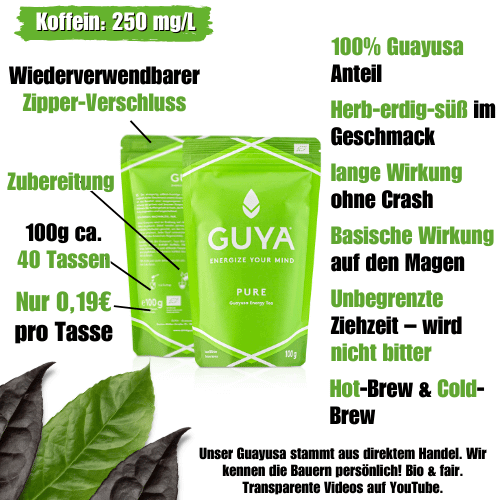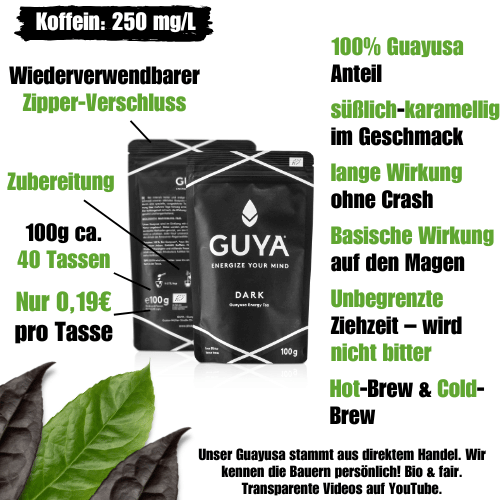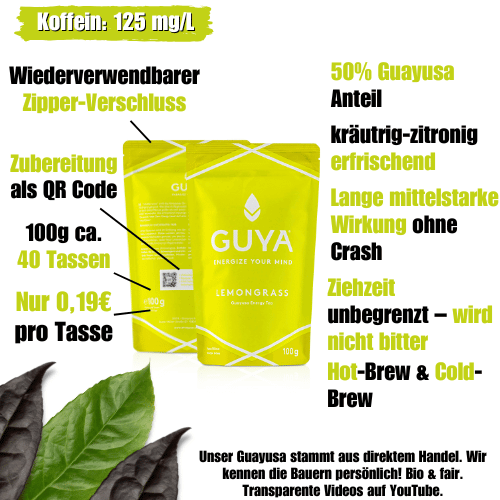Lemon grass tea: effect, healing effect, psyche and side effect

Introduction
Lemongrass originally comes from Southeast Asia and is estimated worldwide because of its versatile application in the kitchen and natural medicine. Especially as tea unfolded Lemon grass one Variety from positive Effects, in particular Healing effects. Lemong grass tea promotes the digestion, supports the relaxation and works antioxidant, anti -inflammatory as well as blood pressure -lowering. At the same time, lemongrass tea can psyche positive influence by stress reduced and the Quality of sleep improved.
Find out everything about that in this article Effect of lemon grass and lemongrass tea, his Health advantages and potential side effects as well as the diverse Healing effect of lemongrass.
Table of contents
- What is lemon grass?
- Health effect of lemongrass tea
- Lemon grass tea and its effect on the psyche
- Effect of lemon grass tea on blood pressure
- Lemon grass: Effect for athletes
- Side effects of lemon grass tea
- Lemon grass and histamine - how tea works in histamine intolerance
- Summary and conclusion
1. What is lemon grass?
Lemon grass, also known as Lemongrass Or under the botanical name Cymbopogon Citratus, is a tropical plant that is mainly known through its fresh, lemon scent and taste. Lemongrass originally comes from Southeast Asia, more precisely from countries such as India, Thailand, Vietnam and Sri Lanka. However, thanks to its versatile use in the kitchen, cosmetics and natural medicine, it has now spread worldwide in tropical and subtropical regions.
1.1 Origin of lemon grass
Lemongrass grows preferably in warm, damp climatic zones and thrives particularly well in nutrient -rich soils. In its homeland, Southeast Asia, it has been used for centuries both as a culinary ingredient and in traditional medicine. It has a permanent place, especially in Thai and Indonesian cuisine. Courts such as soups, curries and marinades give it an unmistakable, fresh note.
The cultivation of lemong grass is now widespread in many tropical regions, including in Africa, Australia and South America. Our lemong grass products like Guayusa-Lemongrass, Lemon grass tea, and Pinapple paradise come from the biodiverses permaculture forest gardens of the Kichwa Indian Ecuadors.
A detailed contribution to the origin of lemon grass, the largest cultivation areas and the differences in cultivation can be found in the article: "Lemon grass origin - where does the delicious herb come from?"
2. Health effect of lemongrass tea

Lemongrass is not only a kitchen star, but also a real miracle herb for health. From its antimicrobial effect to the support of digestion - the plant is full of power.
It also helps to reduce stress, relieve inflammation and even strengthen the immune system. In the next sections we show why lemongrass is a natural all -rounder who should not be missing in any household.
Tradron grass is traditionally used in various cultures to treat numerous complaints, and these traditional areas of application can now also be scientifically justified.
2.1. Antimicrobial properties
The essential oils of the lemon grass, in particular Citral, show a remarkable effectiveness against various pathogenic microorganisms.
Studies have shown that lemon grass oil can inhibit the growth of bacteria such as staphylococcus aureus, bacillus subtilis and pseudomonas aeruginosa. In addition, an antifunal activity against mushrooms such as Aspergillus Niger and Candida species was found.
2.2. Antioxidant effect
The flavonoids contained in lemon grass, in particular Quercetin, have strong antioxidant properties. You can neutralize free radicals, reduce oxidative stress and thus protect cells from damage. This contributes to the prevention of chronic diseases and supports general health. You can find details in this study.
2.3. Anti -inflammatory effects
Lemongrass has anti -inflammatory properties that can help relieve inflammatory processes in the body. This is particularly advantageous for inflammatory diseases and can help alleviate symptoms and promote well-being.
2.4. Antiviral activity
Some Studies Also indicate that lemon grass has antiviral properties that are effective against various viruses.
Lemon grass e.g. as tea can therefore help with prevention and treatment of viral infections.
2.5. Anti -cancer potential
Active substances in the lemon grass, such as Apigeninhave shown that they can inhibit the growth of cancer cells. They promote them Apoptosis (Programmed cell death) in tumor cells and could therefore play a supportive role in cancer therapy. More about this was in this study published.
2.6. Digestive effect
The consumption of lemon grass tea can promote digestion by stimulating the production of digestive juices and reducing flatulence. For this reason, lemongrass tea is used in many countries in the event of digestive complaints.
2.7. Calming and fear reducing effect
Traditionally, lemon grass tea is estimated because of its calming properties. Some studies indicate that it has anxious effects, which supports its use as a natural sedative.
In summary, lemon grass tea offers a wide range of medical effects that are recognized in both traditional medicine and modern scientific studies. Its versatile properties make it a valuable part of naturopathy and potentially also in conventional medicine.
Regular consumption of lemon grass tea can contribute to general health and well -being.
3 lemon grass tea and its effect on the psyche

Lemongrass is traditionally valued for its calming properties on body and psyche. Scientific studies have started to research and confirm these effects. In the following you will find some examples of the healing effect of lemon grass on the psyche.
3.1. Anxious healing effects of lemon grass
Studies have shown that the essential oils contained in lemon grass anxiolytic effects (Fear soothing effect). The Investigation It also showed that the scent of lemon grass oil influences the activity of the nervous system and leads to a reduction in anxiety.
3.2. Atmospheric properties
The aromatic components of the lemon grass can have positive effects on the mood. In Studies It was found that the inhalation of lemong grass oil can alleviate depressive symptoms.
3.3. Promotion of sleep quality
Lemongrass is traditionally used to improve sleep. Scientific Studies indicate that the calming properties of the lemon grass promote sleep quality by calming down the central nervous system.
In summary, both traditional applications and scientific studies indicate that lemon grass can have positive effects on the psyche, especially with regard to the reduction of anxiety, improving the mood and promoting a restful sleep.
4. Effect of lemon grass tea on blood pressure

In addition to the aforementioned healing effects on the body and the psyche, lemon grass tea also has a promising effect in high blood pressure.
4.1. Traditional healing effect of lemon grass
In traditional medicine, especially in Southeast Asian countries, lemon grass tea is often used to promote cardiovascular health. It is assumed that the regular consumption of lemongrass tea contributes to relaxation of the blood vessels and can thus reduce blood pressure. This healing effect of lemongrass tea is also known in Ecuador, the country of origin of our lemon grass grown in accordance with the Amazon rain forest.
A more relaxed cardiovascular system means less stress for the body and accordingly for the psyche, which is why the effect of lemon grass tea, but of course not only, can be interesting for all those affected by high blood pressure.
4.2. Blood pressure-lowering mechanisms of lemon grass tea
The blood pressure -lowering effects of lemon grass tea could be attributed to several factors:
- Diuretic effect: Lemongrass promotes urine output, which can lead to a reduction in blood volume and thus to lower blood pressure.
- Vasodilation: Certain connections in the lemon grass contribute to relaxing the smooth muscles of the blood vessels, which results in their expansion and thus a reduction in blood pressure.
- Antioxidative properties: The antioxidants contained in the lemon grass could reduce oxidative stress markers associated with high blood pressure.
4.3. Recommendations
Due to the limited scientific data situation on the blood pressure -lowering effect of lemongrass tea, you have to pay more attention to how your body feeling develops.
It is advisable to consult a doctor or nutritionist as a therapeutic measure before the regular consumption of lemongrass tea, especially if there are already blood pressure -lowering medication.
5. Lemongrass: Effect for athletes

Lemongrass can also be of interest to athletes. Its ingredients offer potential advantages that can contribute to improving sporting performance and general health.
5.1. Antioxidant properties
The flavonoids and polyphenols contained in lemon grass act as strong Antioxidants. They neutralize free radicals that are increasingly created during intensive physical activity, and thus protect the cells from oxidative stress. This can contribute to faster relaxation after training and strengthen the immune system.
5.2. Anti -inflammatory effects
The anti -inflammatory properties of lemon grass can help reduce inflammation caused by intensive physical activity. This can help relieve sore muscles and to promote regeneration.
5.3. Promotion of digestion
A healthy digestive tract is not only essential for athletes to ensure optimal nutrient absorption. Lemongrass tea Can promote digestion by stimulating the formation of digestive juices and reducing flatulence. This supports the efficient utilization of nutrients, which is important for energy supply during training.
In addition, flatulence and poor nutrient recycling lead to the burden on the psyche, which is why a lemongrass tea can help with its effect to be generally more active and positive.
5.4. Antimicrobial properties
The antimicrobial properties of lemongrass can help strengthen the immune system and prevent infections. A strong immune system is crucial for athletes to avoid training failures due to diseases.
5.5. Mental advantages
The aromatic components of the lemon grass have soothing and mood -enhancing effects. This can help to reduce stress and promote concentration, which is an advantage both in training, competition and in everyday life.
Lemongrass tea offers a number of properties and effects that can be physically and psychologically advantageous for athletes. It supports physical health, promotes regeneration and can contribute to improving sporting performance.
6. Side effects of lemon grass tea
Although the consumption of lemong grass tea is usually safe, side effects can occur in certain cases.
6.1. Allergic reactions
Some people can react sensitively to lemongrass tea and develop allergic symptoms such as rashes, itching or breathing difficulties as a side effect. Such reactions are rare, but consumption should be set and a doctor should be consulted.
6.2. Interactions with medication
Lemongrass tea can cause side effects with certain medication. In particular, people who take blood pressure -lowering or blood -thinning medication should be careful, as lemongrass can potentially lower blood pressure and influence blood clotting. It is advisable to consult a doctor before the regular consumption of lemongrass tea.
6.3. Gastrointestinal complaints
In some people, the consumption of lemongrass can cause tea stomach problems such as nausea or increased gastric acid production. These effects are usually mild, but with persistent symptoms, consumption should also be reduced or adjusted.
6.4. Pregnancy and lactation
There is limited scientific data about the security of lemongrass tea during pregnancy and breastfeeding. Some sources advise pregnant women from consumption because certain ingredients could trigger uterine contractions. This "side effect" of lemon grass tea can of course also be seen as a positive side effect of lemongrass tea to support and any introduction to the birth.
In summary, lemon grass tea is safe for most people. People with existing health complaints or those who take medication should consult a doctor before regular consumption in order to avoid potential side effects or interactions.
7. Lemon grass and histamine - how the tea works in histamine intolerance
Lemon grass (Cymbopogon Citratus) does not contain histamine And is not considered a histamine liberator. Rather, he is said to have Histamin -reducing properties To have what makes it particularly interesting for people with histamine intolerance.
Lemong grass tea can therefore be a soothing option for people with histamine intolerance. Nevertheless, it is important to observe individual reactions and to consult a doctor or nutritionist in the event of uncertainties.
An important point that many confuse: lemong grass has nothing to do with lemons. Lemons are considered to be histamine -containing fruit and as histamine liberators, while lemongrass has none of these properties. This makes lemong grass tea like ours in Permacultures grown lemon grass tea A better good choice for people who are sensitive to histamine.
In summary, it can be said that lemon grass and lemon grass tea due to their Histamin -reducing properties a suitable choice for people with histamine intolerance.
You can find suitable histamine-free tea recipes with lemon grass in our blog post: 7 Discover histamine-free tea recipes with lemon grass
8. Summary and conclusion
Lemongrass is a versatile plant that is valued equally in traditional medicine and modern science. The consumption of lemong grass tea offers a variety of health advantages, including antioxidant, anti-inflammatory and antimicrobial effects.
Lemongrass tea can promote digestion, positively influence the psyche and has blood pressure -lowering effects. Lemongrass is also a valuable means for athletes to support regeneration and general performance. Both as a tea after sports and as a spice in the food.
At the same time, it is important to consider possible side effects. This includes allergic reactions, interactions with medication and potential risks during pregnancy and lactation. The consumption of lemon grass tea is generally harmless and positive, but should be consciously and in moderation if the mentioned conditions are available.
Overall, lemongrass shows impressive health potential that can be used in both the kitchen and in natural medicine. Whether as a tea, essential oil or fresh ingredient - the versatility and the positive effects make lemon grass a natural all -rounder that can be integrated into everyday life.
Our Lemon grass comes from so -called Chakra, these are biodiversity forest gardens that are in harmony with the rainforest through the Kichwa Indigenen Ecuadors be managed. At GUYA we attach particular importance to sustainable and fair business. All of our products have transparency videos for harvesting and processing that you have on YouTube can look. You can find all of our products in Shop.

















